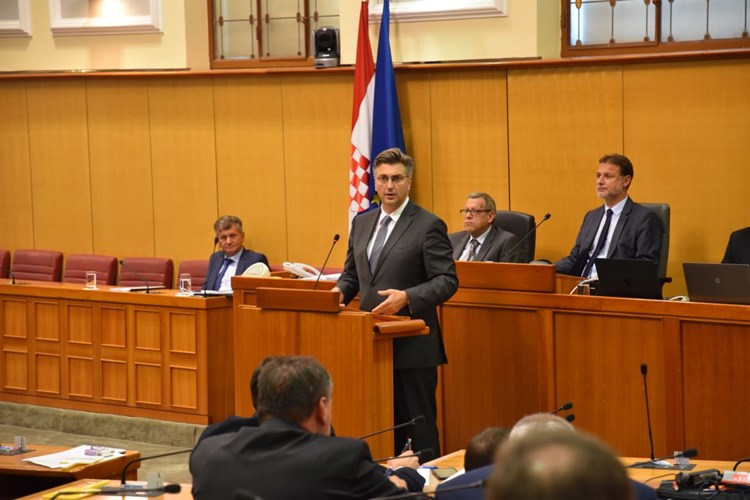


The opposition listed 52 reasons for Kujundzic's impeachment.
"That motion will end up just like the five other initiatives by the opposition so far to impeach ministers or for a no confidence vote in the entire government. These are continued attempts at political discreditation of the minister and government who have found solutions to numerous problems that have accumulated in different sectors of Croatian society," Plenkovic told the opposition MPs in Parliament.
He recalled that the opposition's initiative was launched following the tragic death of a young man in Zapresic and "you didn't need more than a few hours to exploit a human tragedy for this debate."
"You exploited it to launch this initiative, which isn't good because you contributed to creating hysteria. It's always bad when someone loses their life and particularly a young person, however completely contrary to what you alleged then, that young man lost his life because he had congenital problems. He had a grave heart illness and that was the real reason why he isn't among us now. That's why of all these five initiatives, this is the most inappropriate because you misused something that shouldn't be misused. That much etiquette would be good to have in political activism too," Plenkovic said in response to the opposition demands.
He in particular commented on statements by MP Branimir Bunjac (Human Shield) who spoke about not respecting the Council of Europe's position on the protection of young people against violence, emphasising that Bunjac and his party colleagues did not vote for the ratification of the Istanbul Convention.
Plenkovic continued to defend Minister Kujundzic claiming that the modernisation of the healthcare sector is a demanding task, particularly to make it financially sustainable. He said that in 2017 the government had the financial strength to revise the budget and reallocate an additional HRK 1.1 billion to the healthcare sector and added that the healthcare sector had always recorded a deficit, which is what happened last year too. In fact the total debt was reduced from HRK 8.2 billion to HRK 7.8 billion, he said.
Describing Kujundzic's achievements, Plenkovic noted that this year budget revenues from the Croatian Health Insurance Fund (HZZO) increased by 20%, from HRK 2.5 billion to HRK 3 billion. Never has there been as much money in the budget especially for expensive medication - HRK 1.3 billion. Finances were found for children suffering from Spinal Muscular Atrophy and for the drug Spinraza, Croatia is included in clinical testing of new medication for that illness and several patients are already receiving treatment, he added.
Plenkovic noted that 29 hospitals were being modernised and that one of the minister's strategic aims was to establish a National University Hospital as an umbrella institution in the hospital system. The government has secured funds for that capital investment and HRK 42.5 million for a feasibility study for a national children's hospital. Public procurement is being reorganised and emergency services, including the emergency helicopter service, are being reformed, with investments from European and budget funds.
"The minister and government want to make the health system much better than it is now and health services to be accessible, and we are heading towards decentralising primary healthcare," Plenkovic noted.
Minister Kujundzic said that the government wanted reforms and recognised weaknesses, whereas his predecessors "didn't have the guts" to embark on reforms, as shown by the health protection and health insurance laws which had not been touched for more than ten years.
"We've realised that things need to change, that the Croatian people need more, and that's why we have prepared the two bills," Kujundzic underlined. He added that they introduced priority waiting lists in all hospitals and that over the past nine months 15,000 gravely ill patients had been treated and diagnosed and begun therapy within a week.
As for young doctors emigrating, Kujundzic said he was aware of this and that was why money had been secured, specialisation courses had been advertised and that already 200 young people had been sent on such courses.
Text: Hina